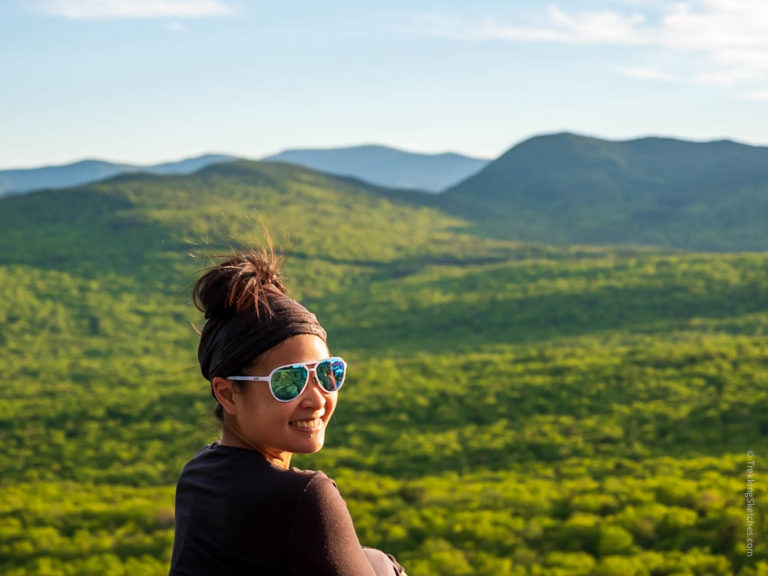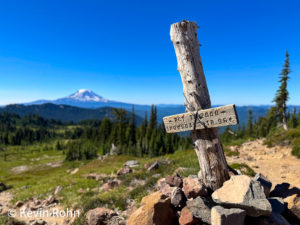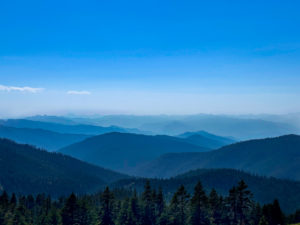I am both an avid hiker and a PhD student. Over the last four years, I have reflected immensely on how the lessons I have learned on trail can apply to my life off trail and vice versa.
I used to find the first mile of a hike to be the hardest. My calves hurt. My breathing feels heavy. The weather is too hot, too cold, too humid, too dry. The miles and elevation ahead seem too daunting. Doubts of my strength and capabilities creep in. I think about turning around, or shortening the hike, or finding some excuse to stop. Sometimes I just want to get to the peak and be done. But simultaneously, I love the physical act of walking. I feel a sense of accomplishment when I finish a climb. I am proud of myself when I can navigate difficult terrain. I like to track my physical, mental, and emotional growth over time. I relish seeing nature change as I climb up mountains and down into valleys. I enjoy sharing this passion with other hikers. In the first mile, I remind myself of these aspects of hiking that I love and press on.
It recently occurred to me, doesn’t this sound exactly like what it feels like to be a doctoral student? When I first sit down to write, my head jumps from idea to idea. My workspace is too noisy, too quiet, too messy, too sterile. The to-do list seems too large. I think about turning to a different project, or answering emails, or changing my dissertation topic altogether (don’t do it!). Sometimes, I just want to get my degree and be done. The feelings of imposter syndrome can take over, making me feel like I am “not good enough” to get a PhD. At the same time, I enjoy the learning process. I get excited when I have a breakthrough or a light bulb moment. I love asking questions and making meaning of human experiences. I feel passionate about my area of study and making a difference in the education landscape. I remind myself of why I chose to pursue doctoral studies when I hit roadblocks.
The parallels between hiking and dissertating are striking.
As my relationship to hiking has transformed over the years, so has my view of being a doctoral student. What if finishing a hike or getting the degree is only a part of the process? What if I can unlearn this “outcomes oriented” approach to living life, pursuing a career, and even recreating? How can I cultivate love and compassion for myself during difficult moments? How can I truly feel that challenges, and how I approach them, are integral to learning, growth, and fulfillment?
In 2017, I moved to Boston to pursue graduate studies. Simultaneously, my husband was introducing me to hiking and camping, which I was pretty resistant to. As one who never spent time outdoors growing up, being in nature did not have the same appeal for me as it did for others. I felt out of place and uncomfortable outside. As a Vietnamese-American woman, I questioned if I belonged in a community where I didn’t see many others who looked like me. And, at that point in my life, I had a really hard time taking space for myself. Relaxing was hard. Being with my own thoughts, being with myself, and being in the moment were even harder. I didn’t want to admit how anxiety-inducing taking an entire day off of work was, nor did I want to admit that I had a really hard time believing in my own physical and mental strength. I felt a constant need to be “perfect” without showing any vulnerability.
In 2018, my husband and I decided to hike the New Hampshire 48 4,000 foot peaks–a pretty big decision given that I had only hiked maybe 10 times in my entire life. But, starting with goal-oriented activities like “peak-bagging” (I am straying away from that term now because it implies that I am somehow dominating nature as opposed to being in relation with it) was great for me. When I struggled on hikes, what kept me going was knowing that I had a goal that I needed to accomplish. Just a few more miles and I would be able to say I exercised (check), I “tagged” one more peak (check), and I could feel good about myself and return to the comforts of home, which meant work and email (check)! What a perfect way to take some “me time” and to barrel through another checklist of tasks. Trust me, I hear the irony there (cue Alanis Morrisette). I went into the woods and mountains not to enjoy nature or to slow down or to embrace a physical activity, but to just “get through” a hike in order to feel accomplished. This mentality mirrored my entire educational journey and work experience to this point.
There are many times over the years that I could have stopped hiking the 48 list or stopped hiking altogether, but something kept me returning to the outdoors despite all the emotional, mental, and physical hurdles. Somewhere in the middle of the 48, things began to subtly shift. Questioning my abilities in the first mile occurred less frequently. I drew on previous experiences to remind myself that the pains of the first mile were only temporary. I started noticing more of the beauty in my surroundings. I began to enjoy the sections between peaks. I stayed more present in the physical and mental challenge of the ascent. I started to feel more at home in the trees and along the ridges of mountains. I found a community of hikers who care about diversity and inclusivity. Being outside allowed for more creative thought to flow through me. I could think about my dissertation and research interests with more freedom and imagination. It has taken years for me to love hiking, to develop confidence, and to truly be present in the moment. I ended up finishing the 48 list and the New England 67 list. In just a few short years, I went from struggling through 5 miles on Mt. Tecumseh to enjoying hiking a 32 mile single-day Pemi Loop and backpacking the Long Trail.
In 2021, on a hike on Franconia Ridge, I was brought to tears when I saw the sun rising over the Pemigewasset Wilderness. Feeling content in nature, with myself, with silence, and seeing all of the places that I had walked on my own two feet over the years was utterly overwhelming.
In many ways, my development into a hiker has informed my development into an academic and vice versa. Towards the beginning of my career, the concept of publishing my work or putting my ideas out into the world was horrifying. Admitting that being a doctoral student inherently meant being a novice was excruciating for a recovering perfectionist like myself. At first, I felt like I knew nothing. I had never taken advanced statistics, critically examined a journal article, or thought about how my worldview could affect how I conduct research. I had never written more than 15 pages and could not fathom churning out a high-quality dissertation. I often felt the “you are not good enough” demons. But now, after three years and a lot of tears, reading, writing, and relying on mentors, I have so much more experience. I am editing articles and providing peers with meaningful feedback. I enjoy generating questions and ideas. When doubt creeps in, I remind myself of how much more I know now than I did when I started and of how I will keep learning over the years. I accept when I need to take breaks from writing and I take them. Writing a dissertation, I have found, is like hiking. It takes thoughtful planning, willingness to adapt when unexpected situations occur, asking for help, and the ability to set and achieve and celebrate small goals along the way. Maybe it is partly about seeing a great view, or summiting a mountain, or adding those letters PhD to the end of my signature. But maybe it is also just as much about developing confidence, being present, finding community, enjoying learning, and believing in myself.
So, as I keep hiking and dissertating, I remind myself:
One step at a time. Celebrate the milestones. Remember how much I’ve learned. Draw on strengths. Lean on others. Recall times I’ve persisted in the face of challenge. Pause and take in the moment. Know that the actual or metaphorical mountain isn’t going anywhere–it is okay to turn around and try again another day.
How does hiking parallel other aspects of your life? What has hiking taught you about yourself?














Be First to Comment